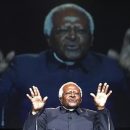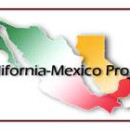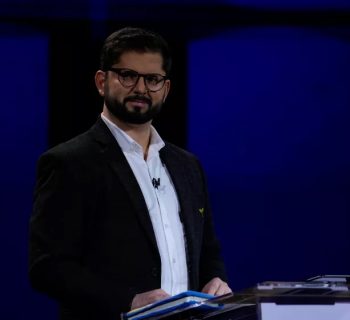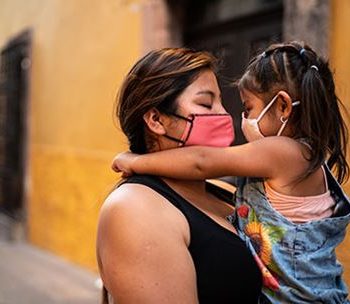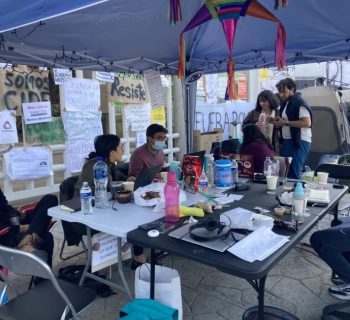EXCLUSIVE Editorial for El Magonista by Gonzalo Santos
He was an indefatigable "prisoner of hope," a fearless and persistent "voice of the voiceless," a true champion of human rights for all - foremost his own black and coloured countrymen and women.
He was a believer in love and the possibility of reconciliation and restorative justice -- but only if truth is first allowed to shine in and expose all past injustices, and then allow the former oppressors to come forth, repent, and redeem themselves by apologizing, and atoning - a process that would then allow for their amnesty and social reintegration -, as well as extending reparations to the victims of apartheid.
Archbishop Tutu was a trailblazer in developing a theology of liberation for our times, blending and putting into action the theologies informing the U.S. Civil Rights Movements - both Malcolm's and Martin's -, the II Vatican Council reorientation of Catholic theology towards social justice under Pope John XXIII, the fierce and determined decolonization theology of the South African Anglican Church, and finally, the Ancient Christian African theologies that have existed in Africa since the time of Jesus.
He supported women in the priesthood and full equality for gays, and forcefully opposed the U.S. disastrous, unjust war in Iraq, demanding George W Bush and Co. be tried as war criminals in the International Court of Justice.
As he led the world's boycott movement against apartheid, he tried to personally persuade president Ronald Reagan to join that boycott, but Reagan - a deeply racist man - was unmoved. Tutu had more luck with the last white prime minister of South Africa, F. W. de Klerk, with whom he negotiated, along with Nelson Mandela, whom he freed in 1990, the abolishing of that regime and the transition to a multiracial democracy.
Why did the U.S. failed to support the South African anti-apartheid national liberation movement from its inception in the 1960s under the ANC led by Nelson Mandel, and for the next three decades of fierce global and national struggles, even after the apartheid regime itself relented and negotiated its own demise? Well, in my master's-level seminars on race, nation, and ethnicity I always presented my bright students with these questions:
Why did the U.S abolished its own brand of apartheid of total segregation - Jim Crow - in the 1950s and 1960s, just a South African erected and consolidated its own heinous brand? Why did The African American Civil Rights Movement triumph relatively soon after World War II (which discredited white supremacy after the Nazis finally "gave it a bad name" in the Pan-European world), while the ANC-led movement, which was carrying the same fight in South Africa, had to keep fighting up until the mid-1990s to finally usher in a new era of multiracial democracy? And after the ANC finally won and Mandela was elected president in 1994, why did the South Africans - white and black – set on a path of truth and reconciliation to consciously expunge their systemic racism, whereas the United States never took that essential step to gain a lasting path to racial reconciliation, at a very steep price: over the last four decades, starting with the Republicans’ embracing their so-called “Southern Strategy,” the nation has inexorably descended into evermore polarized and acrimonious race relations, exacerbated by the racialization of the two-party duopoly -- on the one hand, the GOP has become a mostly-white supremacist, revanchist, now-neofascist party, as if WW II hadn't happened!, and on the other, a multiracial and liberal Democratic Party paralyzed by its own lack of courage in confronting the historic truths of systemic racism, and now incapable of confronting even the present white supremacist assault on American democracy itself?
The answer to all those questions, besides the complex interplay of national political structures, processes, and personalities, has a lot to do with the location of the two countries in the modern world-system: one is now a formerly hegemonic superpower, that had, from 1945 to the early 1990s, the opportunity, the will, and the wherewithal to lead the world (something that it now has reluctantly had to give up); the other country was a semi-peripheral country, significantly regionally but not globally, that could afford to "go at it alone as a pariah country," after World War II, ignore world condemnations and boycotts as long as global capital was willing to invest there, and the U.S. (and the British) looked the other way.
For let's be clear: apartheid South Africa was a strong ally of the U.S. Cold War geopolitical order, and when the Cold War ended, so did apartheid. So, the "systemic" explanation is that the white supremacist Jim Crow regime in the U.S. South had to go for the U.S. to be able to legitimately ascend to global hegemony in the 1950s, as an integral part of the ideological battles of the Cold War; and South African apartheid, which could be count as a loyal (but repulsive) member of the "Free World" could hold on for longer, but had to go when the Cold War ended and the white supremacist regime suddenly found itself without any geopolitical leverage.
Sometimes, it behooves Americans to go beyond their self-absorbed national-level analysis and understand the enormous impact of the structures of the world-system they helped erect to determine when, where, and why opportunities for social change opened, and when they closed. The parallel and opposite histories of the U.S. and South Africa in the 2nd half of the 20th century is one such example of bifurcated paths for almost half a century.
Desmond Tutu saw both arcs of history and try to join them. He fought the Good Fight from the sixties of last century to the twenties of this century. The world is a much better world for having been walked on by this small, funny, fearless man who rose to be the moral conscience of his people, then of humanity.
His last pleadings were to the Israelis to reject, boycott, and abolish their own apartheid system against their Palestinian brothers and sisters, and to all of humanity to save the planet and reject, boycott, and abolish the predatory capitalism of the fossil fuel industries currently destroying the climate of the planet.
Will the world heed his calls for social and planetary justice, non-violent love and restorative justice, universal brotherhood and sisterhood?
The answer is blowing in the wind.

